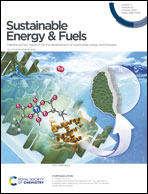Renewable diesel blendstocks and bioprivileged chemicals distilled from algal biocrude oil converted via hydrothermal liquefaction†
Abstract
Hydrothermal liquefaction (HTL) has been demonstrated as a promising technology to convert algae into biocrude oil. However, the knowledge gaps of (1) biocrude oil upgrading and (2) process/energy optimization and design of an algal biorefinery producing valuable bioproducts need to be bridged. In this study, Spirulina (SP) was converted into biocrude oil via HTL. Next, fractional distillation was used to separate SP-derived biocrude oil. It was found that 62% of the viscous SP-derived biocrude oil can be separated into oil and water-soluble products at about 270 °C. Analyses of density, viscosity, acidity, elemental compositions, higher heating values and chemical compositions were carried out for the distillates separated from SP-derived biocrude oil. These analyses showed that 15% distillates could be used as renewable diesel because they have similar heating values (43–46 MJ kg−1) and carbon numbers (ranging from C8 to C18) to petroleum diesel. In addition, GC-MS analysis indicates that some distillates contain bioprivileged chemicals like aromatics, phenols and fatty nitriles that can be used as commodity chemicals. Energy efficiency analysis also demonstrates that the fractional distillation has a lower energy consumption ratio than other HTL biocrude oil upgrading methods. An algal biorefinery roadmap was proposed based on the analyses of different distillates from the SP-derived biocrude oil. Finally, fuel specification analysis was conducted with drop-in renewable diesel, which was prepared with 10 vol% (HTL10) distillates and 90 vol% petroleum diesel. According to the fuel specification analysis, HTL10 exhibited a comparable lubricity (<520 μm), acidity (<0.3 mg KOH per g) and oxidation stability (>6 h) to petroleum diesel. Ultimately, it is expected that this study can provide insights for potential application of algal biocrude oil converted via HTL and improve the process/energy efficiency of an algal biorefinery via HTL.



 Please wait while we load your content...
Please wait while we load your content...